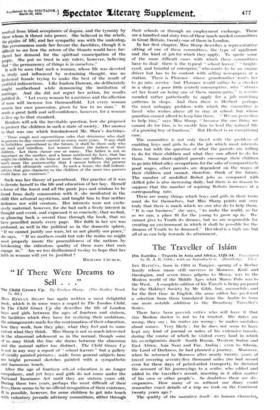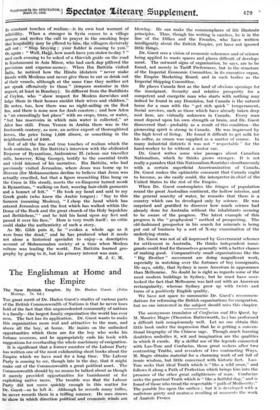The Traveller of Islam
IBM EArri/TA, born in 1304 in Tangier, sprung of a Berber
family whoe name still survives in Morocco, and theologian, and seven times pilgrim to Mecca, was to the Moslem world of the Middle Ages what Marco Polo was to the West. A complete edition of his Travels is being prepared for the Hakluyt Society by Mr Gibb, but, meanwhile, and for the first time in English, the same editor has pn diced a selection from them translated from the Arabic to form one more notable addition to the Broadway Traveller's Series.
There have been peevish critics who will have it that this Moslem doctor is not to 1-:e trusted. His dates are wrong, they say ; his routes are wrong ; he makes mistakes al)out names. Very likely ; for he does not seem to have kept any kind of journal or notes of his extensive travels, during the course of which he visited every land in which his co-religionists dwelt--South Russia. Western Sudan and East Africa, Asia Near and Far, Arabia ; even to Siberia, the Land of Darkness, he had planned a journey. Moreover, when he returned to Morocco after nearly twenty years of travel covering seventy-five thousand miles (no had record even for these days of petrol-aided transport), he dictated the account of his journeyings to a scribe, who edited and added to the traveller's record, inserting in it alien matter of his own or other people's. So doubtless there tor dis- crepancies. How many of us without our diary could remember exact details- of a trip we took on the Continent twenty years ago ?
The quality of the narrative itself—its human character,
its constant touches of realism—is its own best warrant of reliability. When a stranger in Syria comes to a village mosque and recites the call to prayer in the sneaking hope that hospitality may be,offeredto hiin, the.villagers derisively call out : Stem briying ; your fOdder is coming to you." Or, again : " Well, Hajji, how much have you stolen to-day ? " used each evening to be asked of a thievish guide on the road to Kastamouni in Asia Minor, who had each day pilfered the provisions and expense-money. When Ibn ,Battilta visited India, he noticed how the Hindu idolaters " never make friends with Moslems and never give them to eat or drink out of their vessels, although at the same time they neither act nor speak offensively to- them r(iiinpoia mutantur in this respect; at least in Bombay): So different froth the Huddhists of Ceylon, who " show respect for Moslem darwfshes and lodge them in their houses amidst their wives and children." - He notes, too, how there was no night-sailing on the Red Sea, and there is none now for Arab coasters ; and how Aden is "an exceedingly hot place" with no crops, trees, or water, " but has reservoirs in which rain water is collected," as
Men has still. From :Yemen in Arabia there was in the fourteenth century; as noW, an active export of thoroughbred horses, the price being 1;000 dinars, or something in the neighbourhood of £400.
But of all the fine and true touches of realism which the book contains, let Dm Battilta's interview with the abdicated Emperor of Byzantium, Androhicui - (whom our traveller calls, hoWever, -King George), testify to the essential truth and vivid interest of his narrative. Ibn Battfita, who had previously visited Jerusalem, where Jesus was borne up to Heaven (for Mohammedans decline to believe that Jesus was actually crucified, but that a figure resembling Him hung on the Cross in His stead), meets the ex-Emperor turned monk in Byzantium, " walking on foot, wearing hair-cloth garments and a bonnet of felt." " He took my hand and said to my Greek guide (who knew the Arabic tongue) : ' Say to this Saracen: --(meaning Moslem), " I elasp the hand which has entered Jerusalem and the fobt which has walked within the . Dome of the Rock and the great church of the Holy Sepulchre and Bethlehem," ' and he laid his hand upon .my, feet and passed it over his face." Here is very truth itself : no critic could shake' the authenticity of such a story.
As Mr. Gibb puts it, he " evokes a whole age as it were from the dead,° and he has produced what it needs not alone a historical specialist to enjoy—a descriptive account of Mohammedan society at a time when Modern culture was leading the world. Ibnr Battata learned geo- graphy by going to it, but his primary interest was man.
M. J. C. M.

















































 Previous page
Previous page